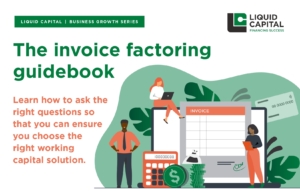Top 4 things to consider when choosing your invoice factoring partner
If you’ve decided that invoice factoring is the solution for your cash flow needs, here are the first 4 things you should consider when choosing a factoring partner.

When your business is poised for a major growth opportunity or you’re about to make a significant operating decision (like purchasing new equipment), your cash flow is vital. But if capital is low, the numbers may not be there to support your next move. To avoid cash flow challenges and potential missed opportunities, many businesses turn to invoice factoring.
Also called accounts receivable factoring, this is when you sell your unpaid invoices to a third party (called a factor), who pays you up front for the invoice minus a small fee. The factor will later collect the payment from your customer directly, which saves you the hassle while getting you cash now.
Once you’ve decided that invoice factoring is the solution to meet your cash flow needs, it’s time to choose the right partner for the task.
To help you in this effort, here are the top four things to consider when choosing an invoice factoring partner:
1. The type of factoring service offered
There are two major paths that factoring generally takes:
- Recourse: Where the customer assumes the risk for and guarantees the invoices. If the client of the customer fails to pay, the customer is responsible for buying back the invoices.
- Non-recourse: Where the factor assumes the risk and guarantees the invoice. This type of factoring is less common and is generally associated with a higher fee structure.
2. The terms and rates of their services
It’s ideal to find a partner that can create agreements similar to those structured at a bank, including features such as 30-day cancellation clauses, giving you a way out if needed.
In terms of fees, even if the upfront rate is low there can be a long list of add-ons that ultimately drive the price much higher; with charges for things like phone calls or ‘same day funding.’
No matter what the terms are, transparency should be the tone for the entire transaction. If a potential partner is not 100% clear with you about what will happen and how, it’s time to move on to the next candidate.

3. Industry experience and depth of knowledge
Given the intricacies and risks associated with different industries, it’s important to find a factoring partner that is experienced in your particular industry. In addition to this industry-specific knowledge, having a team that has been in business for many years can also help to avoid any pitfalls that a less practiced company may inadvertently encounter.
“Liquid Capital is more than just a source of money. My Principal calls regularly, gives me his perspective and shows me my financial trends so we can discuss what next steps make sense for my business.”
4. Service: Speed, availability, flexibility
Factoring, above all else, is a customer-centric activity. So find a partner who is responsive to your needs and is able to deliver high-quality results quickly — within 24 hours of approval ideally.
Given the scalability of factoring, as long as you choose a partner with access to enough capital, you’ll have a funding solution that can grow as big as your goals. For one of our clients, Ray Bowman, using invoice factoring allowed him to grow his business faster than he could have with traditional financing.
Factoring is one of the best alternatives to traditional banking mechanisms, bringing cash flow to growing businesses when it is needed most. Choosing the right partner for invoice factoring means looking beyond the basic rates – which can be misleading. Ultimately, choosing the right invoice factoring partner for your business will have important consequences, so it’s worth taking the time to ask the right questions.







